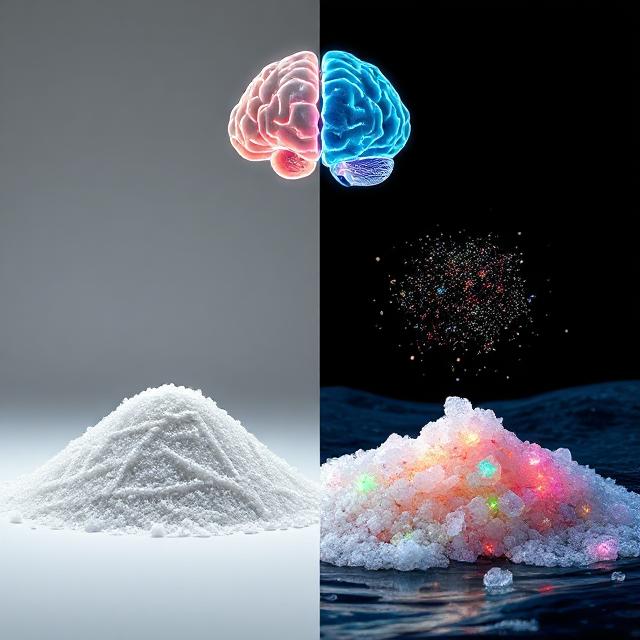
Table of Contents
Sea Salt vs Table Salt: What Matters?
Salt has been a staple of human survival and taste for millennia. But today, it’s more than seasoning—it’s a vital mineral that affects everything from brain performance to hydration balance. And in the health and biohacking space, one debate lingers: sea salt vs table salt—which one truly matters?
In this post, we unpack the real differences between these two common salts and why the choice you make might directly impact your cognitive clarity, energy levels, and electrolyte function.
🧠 Why Salt Matters for Your Brain
Your brain runs on electricity, not just calories. That electricity depends on electrolytes, especially sodium. It helps:
- Generate action potentials (nerve firing)
- Transport nutrients and glucose to neurons
- Regulate hydration inside and outside cells
- Support mental clarity, mood, and memory
In short, no sodium = no signal. And while both table salt and sea salt provide sodium, the differences in their mineral profiles can dramatically affect how your body and brain respond.
🧂 Table Salt: Highly Refined, Highly Depleted
Table salt (sodium chloride) is 99.9% pure NaCl. It’s industrially processed and stripped of all other naturally occurring minerals. Often:
- It’s bleached and treated with anti-caking agents (e.g., sodium ferrocyanide)
- It contains iodine, added to combat goiters and iodine deficiency
- It’s designed for shelf stability, not whole-body health
⚠️ Problems with Table Salt
- Lacks trace minerals: No magnesium, potassium, or calcium
- Can spike blood pressure more easily in sensitive individuals due to its purity and quick absorption
- Heavily processed, meaning your body may absorb it too rapidly, especially on an empty stomach
- Added agents may disrupt gut microbiota in sensitive people
That said, table salt still has utility:
- It’s inexpensive
- It provides iodine, important for thyroid health (though better sources exist)
- It’s universally available
But when it comes to enhancing mental performance, table salt isn’t your best ally.
🌊 Sea Salt: Mineral-Rich and Biologically Aligned
Sea salt is harvested from evaporated seawater and undergoes minimal processing. Depending on its source (Celtic, Mediterranean, Himalayan), it contains up to 80+ trace minerals, including:
- Magnesium: vital for calming brain activity and supporting deep sleep
- Potassium: balances sodium and supports electrical signaling
- Calcium: contributes to neurotransmitter release
- Sulfur, zinc, selenium: support metabolic pathways
✅ Benefits of Sea Salt for Cognitive and Metabolic Health
- Gentler sodium delivery with mineral cofactors that aid absorption
- Supports nerve and muscle balance by working synergistically with other electrolytes
- Natural hydration enhancer, especially during fasting, sauna use, or endurance training
- No added chemicals, anti-caking agents, or synthetic iodization
In essence, sea salt is a functional electrolyte, not just a flavor boost.
📊 Quick Comparison: Sea Salt vs Table Salt
| Property | Table Salt | Sea Salt |
|---|---|---|
| Sodium Purity | ~99.9% NaCl | ~92–98% NaCl |
| Trace Minerals | None | 60–80+ (varies by source) |
| Processing | Heavily refined | Minimally processed |
| Additives | Yes (anti-caking, iodine) | Typically none |
| Taste Profile | Sharper, artificial | Mellow, complex, mineral-rich |
| Best For | Shelf stability | Daily use, hydration, cognitive fuel |
🧪 Brainwave-Boosting Uses for Sea Salt
If you’re working on mental performance or studying intensely, consider how you use salt daily:
Morning Brain Salt Shot
- 8–10 oz warm water
- ¼–½ tsp sea salt
- Optional: lemon or trace mineral drops
→ Supports morning alertness and adrenal rhythm
Pre-Study Electrolyte Mix
- Sea salt + potassium salt + magnesium glycinate
- Taken with adaptogens or before long study sessions
→ Enhances focus and reduces energy crashes
Post-Sauna or Workout
- Bone broth or rehydration blend with sea salt
→ Replenishes sodium and trace elements lost via sweat
These protocols don’t work as effectively with table salt due to its lack of cofactor minerals.
❗ What About Iodine?
A common argument for table salt is iodine enrichment, vital for thyroid hormones. But:
- Seaweed, nori, and kelp are richer sources
- Eggs, fish, dairy, and iodized sea salts offer better absorption pathways
- You can also supplement iodine separately (as potassium iodide) if needed
In other words: you don’t need to rely on table salt for iodine—and shouldn’t sacrifice trace minerals just for it.
🧠 Final Thought: Choosing the Salt That Fuels Cognition
In a brain-optimized lifestyle, quality matters more than quantity. Sea salt supports hydration, neural communication, and metabolic resilience in a way table salt can’t match.
While table salt will keep your food salty, sea salt keeps your brain online.
Upgrade your salt. Upgrade your signal.